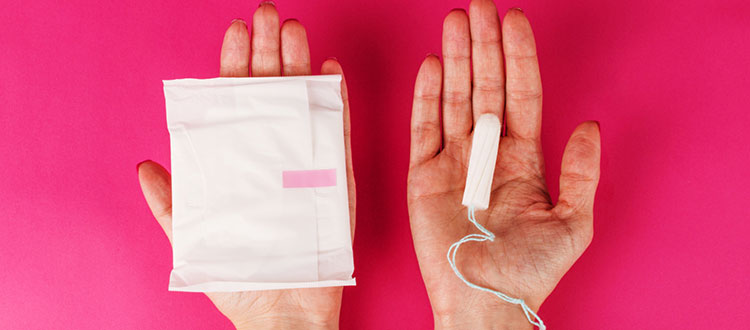Period Power Policies Happening Around the Nation!
 |
| Jamie McConnell Director of Programs & Policy |
Menstruation—and everything it may entail—cramps, hormone changes, cravings, pain, pads, tampons, menstrual cups, period underwear, sadness, depression, anxiety, sore boobs, body odor changes, [insert your own here], is a cycle that people who get their period experience on a regular or irregular basis. It’s a body function that often times is talked about in whispers, or in the confidence of a doctor or close friends. There is a lot of work that needs to be done to bust through the shame and stigma that still surrounds our periods, but one sign that attitudes about periods are changing are the policies that we are seeing on the federal and state level.
Recently, Congresswoman Grace Meng (D-NY) reintroduced the Menstrual Right to Know Act (HR2268) to require period product manufacturers of tampons, pads, cups and underwear to disclose what ingredients they are actually using in products people who menstruate put in and on their body. This is important for a number of different reasons. One, it gets Congress to (gasp) talk about periods. Two, it recognizes that people who get their period have a right to know what’s in the products they are using. When passed, it will give people more power to choose safer products or avoid ingredients they are concerned about and incentivize companies to make safer products.
But it doesn’t stop there. Congresswoman Meng also recently introduced the Menstrual Equity to All Act (HR 1882). The Act recognizes the disparity that exists with affordability and accessibility of a basic human necessity: period products. Just a few important things the bill will do includes allowing federal grants to be used for period supplies, requiring free and unrationed pads and tampons to people who are incarcerated, and requiring Medicaid to cover the costs of period products.
Also expected is the reintroduction of the Robin Danielson Feminine Hygiene Product Safety Act. The bill, by Congresswoman Maloney, will require more research into the health impacts of chemicals in period and intimate care products.
On the state level, at least 55 bills have been introduced to require disclosure of period products, increase access for school aged children and people who are incarcerated, and get rid of the tax on tampons (yes, tampons are taxed as luxury items in 36 states). For a full list of bills click here.
A few of those bills include:
- New York: A.164/S.2387 will require disclosure of ingredients in period care products. A00305 requires all female designated bathrooms in New York to provide free menstrual products.
- Pennsylvania: HB 487 Requires disclosure of ingredients in period products
- New Jersey: A5413 Requires disclosure of ingredients in period products
- Virginia: HB 2956 Requires increased disclosure of ingredients in period products
- Michigan: S.123 abolishes the tampon tax
- Georgia: HB 8 abolishes the tampon tax
- California: AB 31 abolishes the tampon tax
- West Virginia: HB 4598 Requires correctional and penal institutions to provide free menstrual products
- Tennessee: HB 0129 Requires women prisoners to receive free of charge menstrual products, soap, toothbrush and toothpaste.
- Mississippi: HB 1422 Requires incarcerated women to have access to free period products.
The introduction of period policies in almost all 50 states demonstrates that the conversation around periods is changing. It’s way past due that people who menstruate stop paying more for a basic necessity (while items like chapstick and Viagra are exempt from a tax in many states) and that everyone has access to ingredient information and a pad or tampon when they need one. There also needs to be more research into the impact ingredients in these products are having on our health—a health issue that has been almost completely ignored. We still have a long way to go, but these policies make me hopeful that the right to control our periods is within reach.
2019 Bills on Tampon Tax, Menstrual Product Access, and Ingredient Disclosure
Arizona
HB2153: 2019 bill sales tax exemption
Colorado
HB19-1224: Free Menstrual Hygiene Products In Custody
Maine
HP0210 / LD 286: sales tax exemption
SP0296 / LD 1017: Elimination of Highly Toxic and Hazardous Chemicals in the Workplace (includes period products)
Maryland
HB133: free period products in schools
Michigan
SB0123: sales tax exemption
Minnesota
SF2604: free period products in schools
Mississippi
HB1422: free period products in prisons
Nebraska
LB170: sales tax exemption
New Hampshire
HB34 / SB450: free period products in schools
New Mexico
Bill to remove sales tax from period products
New York
A.164/S.2387: require disclosure of ingredients in period care products
A.00290/S.03125: free period products in charter schools
North Carolina
Petition to remove sales tax from period products
First Step Act: includes free period products in prisons
Ohio
HB19: sales tax exemption
Oklahoma
Dignity Act: improve access to period products in prisons
Rhode Island
H5307: sales tax exemption
Tennessee
SB0060 / HB0095: sales tax exemption
SB1046 / HB1483: free period products in schools
HB0129 / SB0075: free period products in prisons





